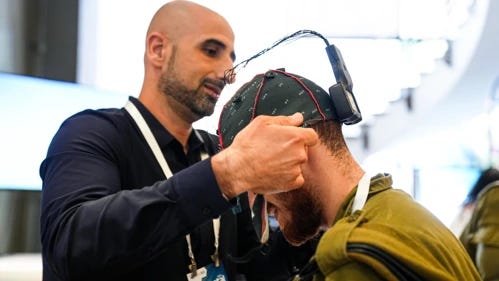🇮🇱 Israel’s Tech Operating System Needs A Reboot
A new report calls time on five myths that once defined Startup Nation.
✉️ ISRAEL TECH INSIDER
Sharp Analysis | No Hype | Just the Signal
Feedback to amir@israeltechinsider.com
🇮🇱 Israel’s Tech Operating System Needs Reboot
Israel’s high-tech sector isn’t just a pillar of the economy. It is the economy: 20% of GDP, 64% of exports, 25% of income tax. The startup economy helped Israel punch above its weight on the global stage, generating outsized exports, attracting foreign capital, and shielding the country from its volatile neighborhood. But the formula that once powered this success—elite military talent, abundant VC, and global trust—is eroding.
A new report from RISE Israel, a think tank for long-term economic strategy, calls time on five myths that once defined Startup Nation. Their paper, Breaking the Consensus (Hebrew), challenges the core assumptions behind Israel’s tech miracle, and warns that without serious course correction, the sector that built modern Israel could stop being its engine. Each has a data-backed reality check—and a set of urgent fixes.
Myth #1: “The talent pipeline is endless"
Reality: 8,300 tech workers left the country between Oct 2023 and July 2024. Another 360,000 reservists were mobilized, many pulled straight from tech roles. War has hollowed out teams and delayed projects. Israel's edge in talent is shrinking from overuse and underinvestment.
RISE's Fix: Build structural support: education, housing, public transit, childcare—especially outside Tel Aviv. Training alone won’t save the pipeline.
Myth #2: “Startups will drive the next growth wave"
Reality: Seed-stage funding is drying up. Most of 2024's $12B went to mature cyber and defense firms. Early-stage firms are quietly dying or relocating. Fewer of them are being born. Capital markets are punishing risk, not rewarding it.
RISE's Fix: Reform the 1984 R&D Law to support product development, infrastructure, and dual-use tech—not just academic research.
Myth #3: “The army and academia will always deliver innovation"
Reality: War disrupted R&D inside the IDF and universities. Israeli academia lags global peers in AI and semiconductors. Multinational collaboration is slowing.
RISE's Fix: Rewire universities: fund faculty, update curricula, fix tech transfer. Tie funding to innovation output. Without world-class research institutions, the pipeline collapses.
Myth #4: “Diversity is just a matter of access"
Reality: Participation by Arabs, Haredim, and women remains low. Legislation and institutional distrust are worsening the gaps. Workforce growth is stalling. Reskilling programs exist, but without childcare, flexible work, and education reform, they’re just theatre. Diversity needs infrastructure.
RISE's Fix: Don’t just open doors—build the on-ramps. Without transportation, in-demand skills, and wraparound services, diversity remains theoretical.
Myth #5: “Tech is insulated from politics"
Reality: During previous wars and election cycles, Israeli tech hummed along, seemingly insulated and impervious. No longer. Israeli high-tech is now visibly entangled in local politics and geopolitical dynamics. Founders are relocating. Investors are hedging. 75% of major funding rounds in 2024 went to companies headquartered outside Israel. A widening gap exists between the tech sector and government—the latter seeing the former as leftist, elitist, and politically subversive. The country's new "AI czar" is a gun-toting, Yeshiva-trained former militia member with zero tech policy credentials.
RISE's Fix: De-politicize the ecosystem. Reconnect with the diaspora. Implement the shelved 2020 AI strategy. Global trust doesn’t rebuild itself.
The Old Playbook Is Broken
The classic Startup Nation loop—defense unit → startup → VC → exit—is outdated. Israel’s tech sector still looks strong on paper, but the erosion is inside the system: talent outflow, weak infrastructure, bureaucratic sprawl, and global perception risk.
Innovation is being strangled by its own org chart: Telem—the so-called National Infrastructure Forum for Research and Development— is not a fully empowered agency and can't direct or enforce spending; Ministry of Science and Technology is sidelined, Innovation Authority, Prime Minister’s Office, Digital Israel, and the Council for Higher Education. Each has a mandate. None has authority. Coordination is a mirage.
RISE calls for a foundational rewrite:
🧭 Strategy, Not Slogans: Israel needs a real AI and innovation roadmap.
🕸️ Streamlined Governance: One empowered body, not a web of acronyms.
🧪 Updated R&D Law: Support full-stack innovation, not just lab work.
🧠 Human Infrastructure: Fix the bottlenecks in talent development.
🎓 Reconnect Academia: Make universities engines of applied innovation.
🌍 Rebuild Global Trust: Or watch the next economy happen elsewhere.
Right now the debate isn’t whether this is happening. It’s whether we’ve already passed the inflection point. The scaffolding that built Startup Nation won’t hold the next economy. What comes next is still up for grabs.
📬 For more signal and less spin → www.israeltechinsider.com
💼 “Best Companies to Work For” List Reads More Like an HR Marketing Campaign
The ink on TheMarker’s 2025 ranking was still wet when the withering online commentary ripped apart its credibility, suggesting that inclusion is tied more to marketing budgets, internal HR pressure, and media pay-for-play dynamics than actual employee satisfaction.
For the second year in a row, TheMarker (Haaretz’s business arm) has published its annual “100 Best Companies to Work For in Israel” list, produced in partnership with CofaceBDi, a business intelligence firm whose lists—based on self-reported HR data, employee surveys, and brand visibility—often blur the line between market research and employer PR. It’s being passed around like gospel among HR teams, employer branding consultants, and tech reporters. But scratch beneath the surface, and the ranking starts to look more like a glossy ad than a credible audit of actual employee experience.
The list’s Top 10 is frozen in time—unchanged despite a volatile year of war, layoffs, and economic uncertainty. Nvidia, Google, Microsoft, Check Point, and Bituach Yashir all retain their exact positions from 2024.
Intel, Israel’s largest tech employer, plunged from #8 to #19. That alone should dominate headlines. But it’s tucked mid-report with little analysis. The same Intel that executed sweeping layoffs and saw morale crater is still considered one of the top 20 places to work?? Meanwhile, eBay—which shut down its Israeli R&D center entirely in May, laying off over 200 employees—is somehow still on the list.
Bituach Yashir, Israel’s direct-to-consumer insurance firm, holds steady at #6—an impressive feat for a company in a sector often characterized by high-pressure sales environments and limited upward mobility. Israel Railways also climbed the rankings—even as commuters and staff continue to flag systemic failures, widespread delays service cancellations, cable thefts, and recurring breakdowns.
Go figure, right? According to the ranking’s fine print, companies that don’t participate in the internal survey can still appear if enough external respondents mention them positively. Translation: if your PR team is loud and your employer brand slick, you can game your way onto the list—even as layoffs roll in or morale tanks.
And knowing, as you do now if you’ve been reading Israel Tech Insider, how Israeli techies really feel about their workplaces, you’d take that list of top places to work with a huge amount of salt.
“Best Companies to Stop Working For”
• Mobile-gaming firm Playtika will dismiss up to 100 employees (about 3 % of staff), roughly half of them in Israel.
• REE Automotive plans to shed more than 100 employees—roughly 50 % of its workforce—amid “going-concern” warnings over its electric-truck platform business.
• U.S. company Seekwell is closing the Israeli development center of 6over6, causing 60 local layoffs while transferring work to American teams.
• eBay will shut its Netanya R&D site by early 2026, laying off approximately 200 employees after several previous downsizing rounds.
• Microsoft’s global 3 % workforce reduction reaches Israel, where around 100 of 3,000 employees are expected to be cut despite parallel hiring in other units.
• AI21 Labs is halting new development for its Wordtune writing assistant, moving the product to maintenance mode and cutting seven team members as it pivots to enterprise AI solutions.
• Cloud-development startup Wing Cloud is closing after raising $20 million, dismissing its remaining 12 employees and open-sourcing its Winglang language.
• AI avatar company D-ID is laying off 22 of 88 workers (25 %) to tighten focus ahead of “accelerated growth,” according to management.
Dual-Use Tech Takes the Field
The IDF's Technology and Logistics Directorate's Innotal program demonstrates how civilian technologies are finally (!) being adapted for military use. Launched during wartime to address urgent operational needs, the initiative partners with Israeli startups to solve challenges ranging from PTSD treatment to combat logistics. The showcase reveals the military's hunger for solutions that enhance soldier welfare and operational efficiency—many originally developed for civilian markets.
Here’s what the army wants:
• Sency.ai: AI-powered physiotherapy system providing real-time feedback for injured soldiers, enabling remote rehabilitation tracking
• GrayMatters: FDA-approved neurofeedback therapy using EEG caps to help soldiers manage PTSD symptoms through mental training exercises
• Anina: Compact food capsules using Israeli technology that transform into hot, nutritious meals when heated—adapted with higher protein for combat units
• Mima: Gluten-free pizza technology for soldiers with celiac disease, featuring contamination-free packaging for shared heating facilities
• Homebiogas: Waste-to-energy containers processing half-ton daily military base waste through gasification at 1000°C with non-toxic emissions
• CATAI: AI diagnostic system identifying skin lesions from photos alone, focusing on fungal infections and leishmaniasis for remote soldiers
• Ruby AI: Autonomous robotic washing systems for armored vehicle maintenance using smart video technology and high-pressure cleaning
• Parazero: Blood delivery drone "Adamdam" with temperature-controlled containers maintaining viability for 72 hours and precision parachute landing
• AIR: "The Genie" logistics drone carrying 250kg payloads over 50km autonomously, delivering supplies directly to isolated forces
• Termotera: Off-grid climate control converting nighttime dew to energy, maintaining 24-25°C in extreme conditions without external power.
Upcoming Events
16 June. Building the Future with AI Agents. Google for Startups Israel, together with Horizon Capital and Genesis Accelerator, is hosting an event focused on the transformative role of AI agents in startups. The program will bring together leading Israeli AI startups, investors, and industry partners to discuss top companies in the field, major investment opportunities, essential infrastructure and talent, and strategic considerations for deploying AI agents within organizations, featuring talks from experts across the ecosystem.
18–19 June. Money Tel Aviv, Israel’s largest online payments event, will gather over 400 professionals and companies from eCommerce, Travel Tech, and AdTech on The agenda features expert panels on key industry topics and a startup showcase, fostering global connections and innovation in fintech payments.
23-26 June: Cyber Week 2025, one of the world’s leading cybersecurity conferences, will take place June 23–26 at Tel Aviv University, bringing together top global cybersecurity experts. Organized by the Blavatnik Interdisciplinary Cyber Research Center with support from Israel’s National Cyber Directorate and government partners, the event features conferences, seminars, roundtables, and networking focused on aviation, innovation, disinformation, international collaboration, AI, cloud security, fraud, critical infrastructure protection, crisis management, and a startup exhibition. Cyber Week serves as a key platform for business partnerships, exposure to breakthrough developments, and strengthening Israel’s cyber ecosystem. Admission is free with prior registration.
29 June. Globes, Afeka College, and the Trump Foundation invite you to the FUTURE SKILLS conference in Tel Aviv. This event will gather leaders from industry, education, the military, academia, and HR to discuss the critical skills needed for success in the high-tech sector. Sessions will focus on how future-ready competencies are developed at every stage—from school and military service, through academia, and into the workforce. Attendees will gain insights from new research on international standards and have opportunities for cross-sector networking. Don’t get automated! Click here to register.




